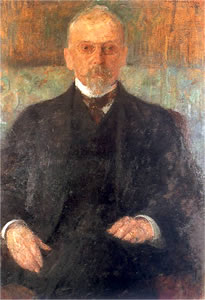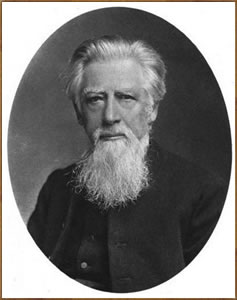De Hongaarse dichter en schrijver Miklós Radnóti werd geboren op 5 mei 1909 in Boedapest. Zie ook mijn blog van 5 mei 2008.
War Diary
1. Monday Evening
You see, now fear often fingers your heart,
and at times the world seems only distant news;
the old trees guard your childhood for you
as an ever more ancient memory.
Between suspicious mornings and foreboding nights
you have lived half your life among wars,
and now once more, order is glinting toward you
on the raised points of bayonets.
In dreams sometimes the landscape still rises before you,
the home of your poetry, where the scent of freedom
wafts over the meadows, and in the morning when you wake,
you carry the scent with you.
Rarely, when you are working, you half-sit, frightened
at your desk. And it’s as if you were living in soft mud;
your hand, adorned with a pen, moves heavily
and ever more gravely.
The world is turning into another war—a hungry cloud
gobbles the sky’s mild blue, and as it darkens,
your young wife puts her arms around you,
and weeps.
2. Tuesday Evening
Now I sleep peacefully
and slowly go about my work—
gas, airplanes, bombs are poised against me,
I can neither be afraid, nor cry;
so I live hard, like the road builders
among the cold mountains,
who, if their flimsy house
crumbles over them with age,
put up a new one, and meanwhile
sleep deeply on fragrant wood shavings,
and in the morning, splash their faces
in the cold and shining streams.
*
I live high up, and peer around:
it is getting darker.
As when from a ship’s prow
at the flash of lightning
the watchman cries out, thinking he sees land,
so I believe in the land also—and still I cry out life!
with a whitened voice.
And the sound of my voice brightens
and is carried far away
with a cool star and a cool evening wind
Vertaald door Lucy Helen Boling

Miklós Radnóti (5 mei 1909 – 9 november 1944)
De Amerikaanse schrijver Morton Rhue (pseudoniem van Todd Strasser) werd geboren op 5 mei 1950 in New York. Zie ook mijn blog van 5 mei 2008.
Uit: Give a Boy a Gun
“Around 10 P.M. on Friday, February 27, Gary Searle died in the gymnasium at Middletown High School. After the bullet smashed through the left side of his skull and tore into his brain, he probably lived for ten to fifteen seconds.
The brain is a fragile organ suspended in a liquid environment. Not only does a bullet destroy whatever brain tissue is in its path, but the shock waves from the impact severely jar the entire organ, ripping apart millions of delicate structures and connections. In the seconds that follow, the brain swells with blood and other fluids. The parts of the brain that control breathing and heartbeat stop. One doctor described it to me as ‘an earthquake in the head.’
At the moment of Gary’s death I was in the library at the state university, where I was a sophomore studying journalism. As soon as I heard the news, I went home to Middletown, determined not to leave until I understood what had happened there.
Returning to Middletown was like stepping into a thick fog of bewilderment, fury, agony, and despair. For weeks I staggered through it, searching out other lost, wandering souls. Some were willing to talk to me. Others spoke because they felt a need to defend themselves even though no one had pointed an accusing finger at them. Some even sought me out because they wanted to talk. As if speaking about it was a way of trying to figure it out, of beginning the long, painful process of grieving and moving ahead.”

Morton Rhue (New York, 5 mei 1950)
De Nederlandse dichteres Petra Else Jekel werd in Arnhem geboren op 5 mei 1980. Zie ook mijn blog van 5 mei 2007 en ook mijn blog van 5 mei 2008.
Nooit meer bewegen
remmend braak ik snelheidsduivelsangsten uit
zweet benzine in een spoor achteruit tot file inkookt
tolereer ik leven om mij heen, in mij, giet beweging
in mij, ontsteek mijn dorst, wrijf warmte in mijn huid en
ik zal voortbewegen van ik naar mens naar mij, opbranden
wat kost mij dit meereizen op de sissende grillstaven van tijd
kan de wereld mij echt niet missen, komt zij tot stilstand
net als de ogen die mijn rijden waarnemen, mijn rijdend
spelen met jou, mijn draaikolk om jouw standpunt, dans
uit slurpende brandstofdorst, tankwagengeladen slangen
dans uit alle macht aardlagen te persen tot beestensap
hoeveel lagen telt mijn huid na schuren nog, over
hardstenen wegen, organisch uitgesleten spoor van
dit uit volle vaart afremmen, stap voor stap voor dood

Petra Else Jekel (Arnhem, 5 mei 1980)
De Amerikaanse dichter, schrijver en journalist Christopher Morley werd geboren op 5 mei1890 in Haverford, Pennsylvania. Zie ook mijn blog van 5 mei 2007 en ook mijn blog van 5 mei 2008.
Our House
IT should be yours, if I could build
The quaint old dwelling I desire,
With books and pictures bravely filled
And chairs beside an open fire,
White-panelled rooms with candles lit–
I lie awake to think of it!
A dial for the sunny hours,
A garden of old-fashioned flowers–
Say marigolds and lavender
And mignonette and fever-few,
And Judas-tree and maidenhair
And candytuft and thyme and rue–
All these for you to wander in.
A Chinese carp (called Mandarin)
Waving a sluggish silver fin
Deep in the moat: so tame he comes
To lip your fingers offering crumbs.
Tall chimneys, like long listening ears,
White shutters, ivy green and thick,
And walls of ruddy Tudor brick
Grown mellow with the passing years.
And windows with small leaded panes,
Broad window-seats for when it rains;
A big blue bowl of pot pourri
And–yes, a Spanish chestnut tree
To coin the autumn’s minted gold.
A summer house for drinking tea–
All these (just think!) for you and me.
A staircase of the old black wood
Cut in the days of Robin Hood,
And banisters worn smooth as glass
Down which your hand will lightly pass;
A piano with pale yellow keys
For wistful twilight melodies,
And dusty bottles in a bin–
All these for you to revel in!
But when? Ah well, until that time
We’ll habit in this house of rhyme.
Dedication for a Fireplace
THIS hearth was built for thy delight,
For thee the logs were sawn,
For thee the largest chair, at night,
Is to the chimney drawn.
For thee, dear lass, the match was lit
To yield the ruddy blaze–
May Jack Frost give us joy of it
For many, many days.

Christopher Morley (5 mei 1890 – 28 maart 1957)
De Franse dichter, schilder en criticus George Albert Aurier werd geboren op 5 mei 1865 in Châteauroux (Indre). Zie ook mijn blog van 5 mei 2008.
Uit: Biribi
“Bravo ! Encore un coup d’épée dans le ventre de cette vieille sacro-sainte idole : l’Armée !… – Mais, l’Armée, Monsieur, c’est la patrie ! Et puis, vous ne le nierez pas, l’Armée est nécessaire ! – Le choléra aussi est nécessaire. Est-il pour cela défendu de le blaguer ou vilipender ? Ne vaudrait-il point mieux froidement discuter telles assertions, étudier les documents présentés ? Quant à moi, ô candide bourgeois, que vous anathématisassiez ou que vous n’anathématisassiez point les sacrilèges mangeurs de guerriers, et M. Darien en particulier ! Je constate seulement ceci : que l’armée me semble un peu trop redouter critique et discussion, pour avoir la conscience aussi nette qu’elle le clame. Quoi qu’il en soit, si les épouvantables faits racontés par M. Darien, dans Biribi, sont exacts – et j’ai cru reconnaître dans son livre l’indubitable accent de la vérité, – il est dès maintenant démontré qu’il existe, en plein XIXe siècle, des tortionnaires plus cruels, plus raffinés, plus atrocement lâches que les moines de l’Inquisition, et que ces répugnants torquemadas, à la fois juge s, gardes-chiourmes et bourreaux, sont des officiers, de ces courageux et nobles officiers français dont les culottes vermillon sont si chères à M. Prudhomme ! Oui, M. Prudhomme, lisez ce roman, et si, à cette tragique évocation des martyres compliqués et barbares, des féroces assassinements à coups d’épingles qu’on fait subir, là-bas, dans cette fournaise du Sud Algérien, aux pauvres Camisards, vous ne sentez pas vos moelles bouleversées d’un frisson, et si vous ne crachez point quelques injures indignées vers l’Armée et vers ceux qui vivent de l’Armée, c’est que vous êtes, ainsi que je l’ai toujours pensé, incurable. »

Portret door Félix Valloton
De Poolse schrijver en journalist Henryk Adam Aleksander Pius Oszyk-Sienkiewicz werd geboren in Wola Okrzejska op 5 mei 1846. Zie ook mijn blog van 5 mei 2007 en ook mijn blog van 5 mei 2008.
Uit: Quo Vadis? (Vertaald door Paul Seliger)
“Petronius erwachte erst gegen Mittag und zwar wie gewöhnlich noch sehr ermüdet. Am Tage zuvor war er bei Nero zu einem Gastmahle eingeladen gewesen, das sich bis spät in die Nacht hineingezogen hatte. Seit einiger Zeit fing seine Gesundheit an zu leiden. Er selbst klagte darüber, daß er am Morgen stets wie an allen Gliedern zerschlagen aufwache und nicht imstande sei, seine Gedanken zu sammeln. Aber das Morgenbad und die damit verbundene sorgfältige Massage durch seine darin geschulten Sklaven brachten dann allmählich sein träges Blut wieder in Bewegung, erfrischten, belebten ihn und erfüllten ihn mit neuer Kraft, so daß er aus dem Salbzimmer, der letzten Abteilung des Bades, wie neuerstanden heraustrat, mit Augen, die von Geist und Heiterkeit strahlten, verjüngt, voller Leben, in rosiger Laune und in so vornehmer, tadelloser Haltung, daß sich selbst Otho nicht mit ihm vergleichen konnte: kurz, wirklich als »arbiter elegantiarum,« als oberster Richter in Sachen des feinen Geschmacks, wie man ihn nannte.
In den öffentlichen Bädern verkehrte er selten und nur dann, wenn ein berühmter Rhetor, von dem man in der ganzen Stadt sprach, auftrat oder wenn aus Anlaß einer Ephebenfeier besonders aufregende Ringkämpfe zu erwarten waren. Er besaß in seiner Villa, »Insula,« eigene Bäder, welche ihm Celer, der berühmte Fachgenosse des Severus, erweitert, umgebaut und mit so erlesenem Geschmacke eingerichtet hatte, daß selbst Nero ihnen den Vorzug vor den kaiserlichen Bädern einräumte, obgleich diese letzteren ausgedehnter und mit ungleich größerem Prunk ausgestattet waren.”

Henryk Sienkiewicz (5 mei 1846 – 15 november 1916)
Portret door Olga Boznańska
De Engelse dichter Richard Watson Dixonwerd geboren in Islington op 5 mei 1833 – Warkworth. Dixon werd opgeleid aan de King Edward’s School in Birmingham en Pembroke College in Oxford. Hij raakte betrokken bij de fameuze ‘Birmingham Group’, waarvan ook William Morris, Edward Burne-Jones, Gerard Manley Hopkins en Robert Bridges deel uitmaakten. Als geestelijke was Dixon vele jaren kanunnik van Carlisle. Hij was de auteur van The History of the Church of England from the Abolition of Roman Jursidiction. dat verscheen in zes delen tussen 1878 en 1902. Hij publiceerde diverse dichtbundels. Zijn beste werk is verzameld in Poems: A Selection, with a Memoir (1909), geredigeerd door Robert Bridges.
Love’s Consolation
All who have loved, be sure of this from me,
That to have touched one little ripple free
Of golden hair, or held a little hand
Very long since, is better than to stand
Rolled up in vestures stiff with golden thread,
Upon a throne o’er many a bowing head
Of adulators; yea, and to have seen
Thy lady walking in a garden green,
‘Mid apple blossoms and green twisted boughs,
Along the golden gravel path, to house
Herself, where thou art watching far below,
Deep in thy bower impervious, even though
Thou never give her kisses after that,
Is sweeter than to never break the flat
Of thy soul’s rising, like a river tide
That never foams; yea, if thy lady chide
Cruelly thy service, and indeed becomes
A wretch, whose false eyes haunt thee in all rooms,
‘Tis better so, than never to have been
An hour in love; than never to have seen
Thine own heart’s worthiness to shrink and shake,
Like silver quick, all for thy lady’s sake,
Weighty with truth, with gentleness as bright.

Onafhankelijk van geboortedata:
De Romeinse dichter Gaius Valerius Catullus werd geboren in 87 v. Chr, in Sirmione bij Verona. Catullus was de eerste grote Latijnse lyricus. Als een van de invloedrijkste dichters van de 1e eeuw voor Christus uit de Ciceroniaanse periode schreef hij ongeveer 116 gedichten (totaal circa 2300 verzen). Over het leven van Catullus is weinig met zekerheid bekend. In Sirmione, dat hij in zijn gedichten bezong, kan men nu nog de Villa di Catullo bezoeken. Catullus behoorde tot een gegoede familie, zodat hij naar Rome kon trekken om er zijn studies te voltooien. Daar sloot hij zich aan bij de nieuwe ‘experimentele’ richting van de poetae novi of neoteroi: een groep opkomende dichters die geïnspireerd waren door de Alexandrijnse dichters en niets moesten weten van de oubollige, al te ernstige Oud-Latijnse poëzie. Catullus noemde zichzelf dan ook een poeta novus (nieuwe dichter). Hij was alleszins de meest getalenteerde uit deze literaire kring. In Rome genoot Catullus als rijke bon-vivant met volle teugen van het leven. Zo werd hij hopeloos verliefd op Clodia, de frivole echtgenote van Quintus Metellus Celer (stadhouder van Gallia Cisalpina), en een zuster van de beruchte demagoog en tribunus plebis Clodius. Deze weinig eerbare dame zou weldra het leven van de jonge dichter domineren en zelfs verwoesten. Zij was vermoedelijk Catullus’ voornaamste inspiratiebron voor zijn liefdesgedichten, waarin hij haar met een schuilnaam Lesbia noemt als hulde aan de dichteres Sappho van het Griekse eiland Lesbos. In de gedichten beschreef hij alle fasen van hun wispelturige relatie: de eerste verliefdheid, de liefde en de nasleep. Catullus’ bekendste gedichten, Odi et Amo en Ille mi par esse deo videtur, horen bij deze groep gedichten. De relatie kende ups en downs, en eindigde in het jaar 58 voor Christus. Catullus overleed op jonge leeftijd, tussen 54 en 47 v.Chr. Het is niet duidelijk wat de doodsoorzaak was.
Carmen 7
Vraag je, Lesbia, hoeveel kussen van jou voor mij,
zouden er genoeg en meer dan genoeg zijn?
Zo veel als ’t grote aantal van Libyssische zandkorrels
dat ligt in ’t lasarpicium voortbrengend Cyrene
tussen ’t in hitte gelegen orakel van Juppiter en
’t heilige graf van de oude Battus;
of als de vele sterren die, terwijl de nacht zwijgt,
de buitenechtelijke liefde van de mensen aanschouwen:
dat jij zoveel kussen kust,
is voldoende en meer dan voldoende voor gekke Catullus
opdat de nieuwsgierigen niet tellen
kunnen en opdat slechte tongen niet kunnen betoveren.
Vertaald door Rudy Negenborn

De Vlaamse dichter Wouter Steyaert werd geboren in Gent in het jaar 1982. Hij studeert farmacie en biotechnologie. Hij publiceert poëzie in verschillende literaire tijdschriften (bijv. Gierik & Nieuw Vlaams Tijdschrift, Krakatau en Ballustrada). Zijn gedichten werden meermaals bekroond, onder andere in de Basiel de Craeneprijs en de Literaire Prijs van de stad Harelbeke. In 2007 won hij de HC-trofee schrijfwedstrijd. Wouter Steyaert heeft een eigen blog bij Skynet. (Zie link)
Engel
Staar naar de uitgebloeide windroos
op het hoofd van de bloedende hoos.
Klapper kruimels in mijn kruin en kruis
mijn armen, mijn vingers, mijn ogen,
verwissel de wind met het maanzaad.
Bespeel mijn natte vinger nog een keer
met je vloeibaar gemoed, je dartele
tanden en een gelaatsuitdrukking of
twee. Blaas met ingetogen teugen de
tellen uit mijn voltooid verstand, mijn
harmonische mond uit de orgelkamer.
Verveel je als een naakte, blauwe engel
op een steen, kleiner dan een kooi, gooi
geblinddoekt een paar tamme gedachten
in je fantasie en week me van je af
snaar na snaar, als een perfectionist.

Zie voor onderstaande schrijver ook mijn blog van 5 mei 2008.
De Duitse dichter Christian Friedrich Scherenberg werd geboren op 5 mei 1798 in Stettin
